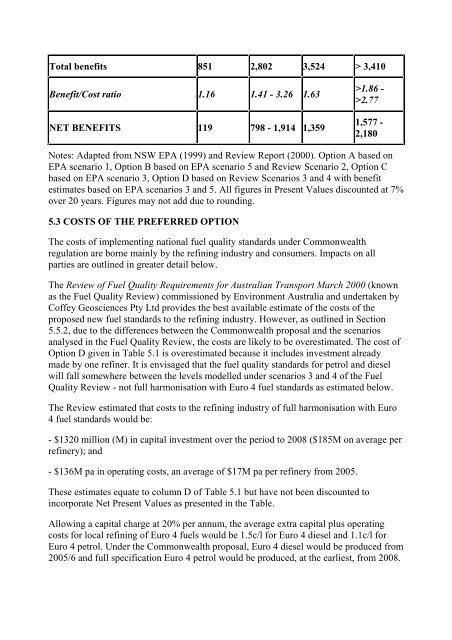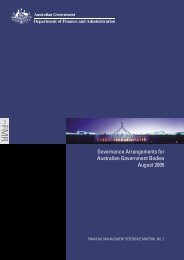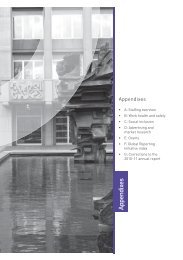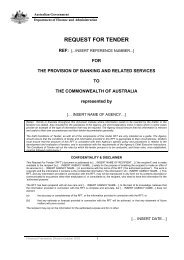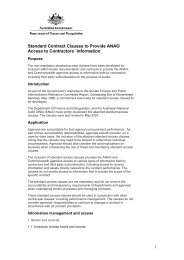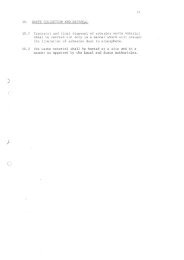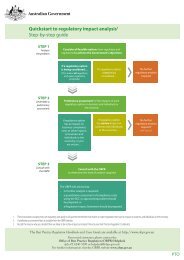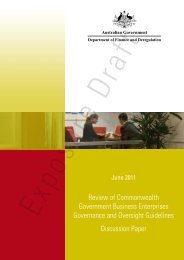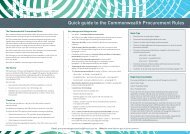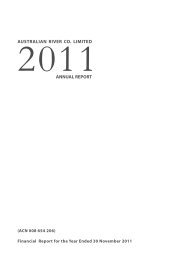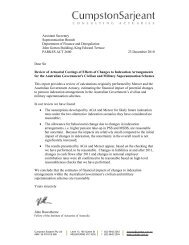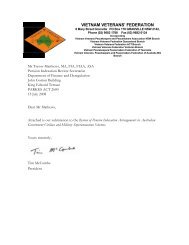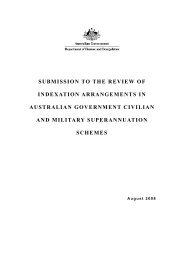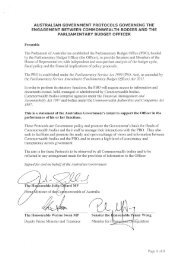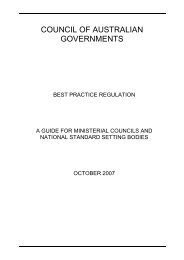National Fuel Quality Standards Regulation Impact Statement 1 ...
National Fuel Quality Standards Regulation Impact Statement 1 ...
National Fuel Quality Standards Regulation Impact Statement 1 ...
Create successful ePaper yourself
Turn your PDF publications into a flip-book with our unique Google optimized e-Paper software.
Total benefits 851 2,802 3,524 > 3,410<br />
Benefit/Cost ratio 1.16 1.41 - 3.26 1.63<br />
NET BENEFITS 119 798 - 1,914 1,359<br />
>1.86 -<br />
>2.77<br />
1,577 -<br />
2,180<br />
Notes: Adapted from NSW EPA (1999) and Review Report (2000). Option A based on<br />
EPA scenario 1, Option B based on EPA scenario 5 and Review Scenario 2, Option C<br />
based on EPA scenario 3, Option D based on Review Scenarios 3 and 4 with benefit<br />
estimates based on EPA scenarios 3 and 5. All figures in Present Values discounted at 7%<br />
over 20 years. Figures may not add due to rounding.<br />
5.3 COSTS OF THE PREFERRED OPTION<br />
The costs of implementing national fuel quality standards under Commonwealth<br />
regulation are borne mainly by the refining industry and consumers. <strong>Impact</strong>s on all<br />
parties are outlined in greater detail below.<br />
The Review of <strong>Fuel</strong> <strong>Quality</strong> Requirements for Australian Transport March 2000 (known<br />
as the <strong>Fuel</strong> <strong>Quality</strong> Review) commissioned by Environment Australia and undertaken by<br />
Coffey Geosciences Pty Ltd provides the best available estimate of the costs of the<br />
proposed new fuel standards to the refining industry. However, as outlined in Section<br />
5.5.2, due to the differences between the Commonwealth proposal and the scenarios<br />
analysed in the <strong>Fuel</strong> <strong>Quality</strong> Review, the costs are likely to be overestimated. The cost of<br />
Option D given in Table 5.1 is overestimated because it includes investment already<br />
made by one refiner. It is envisaged that the fuel quality standards for petrol and diesel<br />
will fall somewhere between the levels modelled under scenarios 3 and 4 of the <strong>Fuel</strong><br />
<strong>Quality</strong> Review - not full harmonisation with Euro 4 fuel standards as estimated below.<br />
The Review estimated that costs to the refining industry of full harmonisation with Euro<br />
4 fuel standards would be:<br />
- $1320 million (M) in capital investment over the period to 2008 ($185M on average per<br />
refinery); and<br />
- $136M pa in operating costs, an average of $17M pa per refinery from 2005.<br />
These estimates equate to column D of Table 5.1 but have not been discounted to<br />
incorporate Net Present Values as presented in the Table.<br />
Allowing a capital charge at 20% per annum, the average extra capital plus operating<br />
costs for local refining of Euro 4 fuels would be 1.5c/l for Euro 4 diesel and 1.1c/l for<br />
Euro 4 petrol. Under the Commonwealth proposal, Euro 4 diesel would be produced from<br />
2005/6 and full specification Euro 4 petrol would be produced, at the earliest, from 2008.


